“Governance of Data for AI in the Health Sector: Cases from MENA” and “AI for Food Security: Perspectives from MENA": Sessions Brief
2024-02-29
2024-02-29
Ever wondered about the journey your data takes in the digital realm? Ever thought of how artificial intelligence (AI) is shaping the landscape of healthcare and food security in our region? Join us at the Access to Knowledge for Development Center (A2K4D) at the American University in Cairo’s School of Business as we explore the complexities of data governance and AI integration in the Middle East and North Africa (MENA) region.
In collaboration with the Center of Continuing Education at Birzeit University, Palestine, A2K4D is working on a research project that delves into the governance of responsible AI and data for development across two pivotal tracks: the governance of health data for AI and AI's role in ensuring food security. This work was recently featured at the Access to Knowledge for Development Center's Fourteenth Anniversary Workshop under the title: "Artificial Intelligence, Data, and Platform Work: MENA Case Studies & AI Observatory." The workshop served as a platform to showcase our research findings and those of our MENA partners working on case studies on the governance of data for AI in the health and food security sectors in their respective countries. The workshop was also an opportunity to launch our MENA AI Observatory, where we feature our work and that of others working on the governance of data and AI in the region. Audience engagement was live and insightful.
Our first Session: Governing Data for AI in the Health Sector: Exploring Regional Realities
Our first session delved into the "Governance of Data for AI in the Health Sector: Cases from MENA." Here, we shared findings from our regional health studies, reflecting on the links between data governance and AI in healthcare based on cases from Lebanon, Morocco, Palestine, Tunisia, and Egypt.
Guided by the principles of Protecting People, Promoting Health Value, and Prioritizing Equality, our exploration of health data governance is framed within the World Bank’s Health Data Governance Principles provided by the World Bank. Through regional case studies, we surveyed health data governance in both public and private sectors to understand how health data is governed, seeking to bridge the gap between policy and practice by recommending a path towards responsible data governance for the future deployment of AI in the health sector.
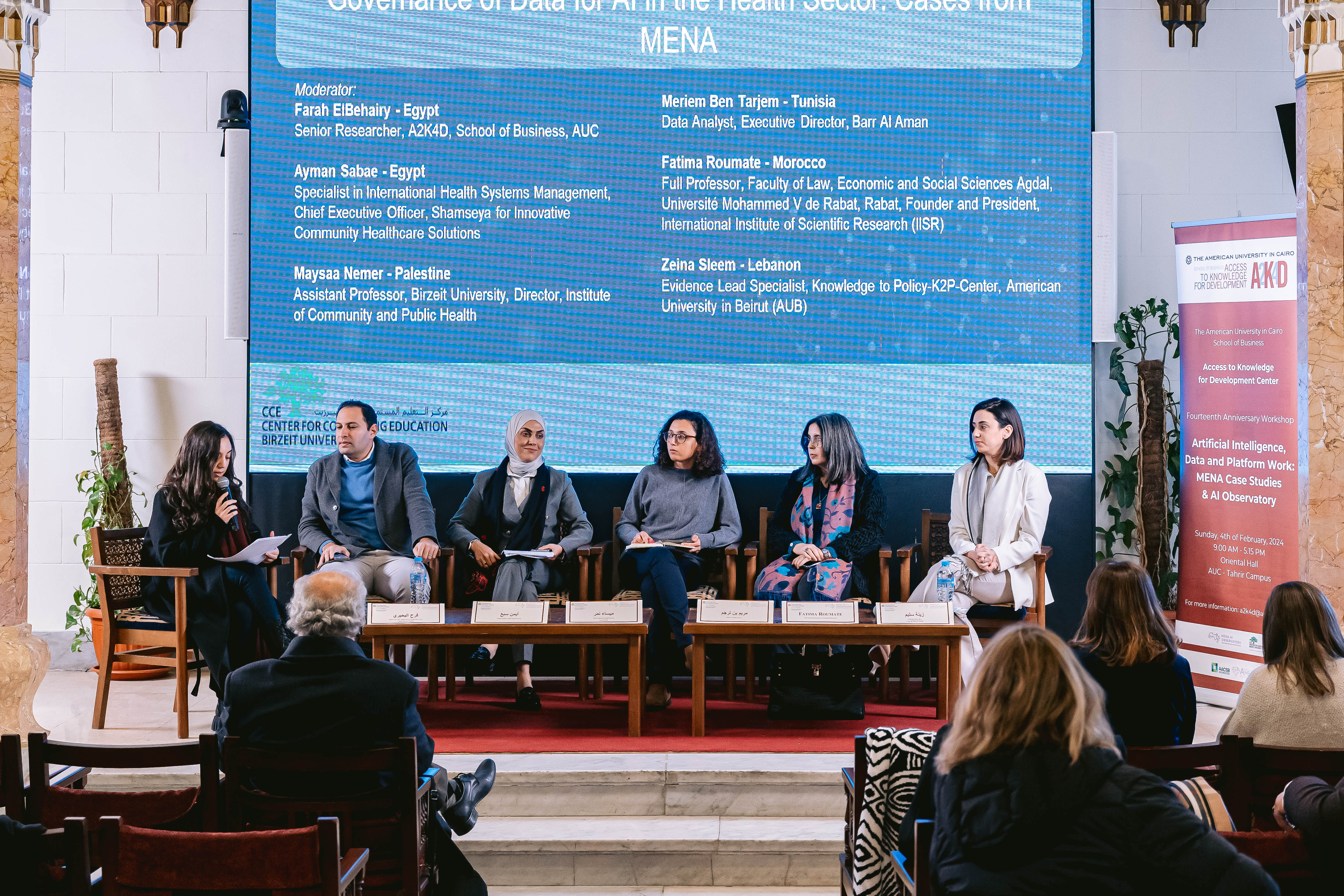
Regional Case Studies and Discussions:
From Palestine, we worked alongside Maysaa Nemer, Assistant Professor and Director of the Institute of Community and Public Health at Birzeit University. From Tunisia, we have Meriem Ben Tarjem, Data Analyst and the Executive Director at Barr Al Aman. Morocco contributes its knowledge through Fatima Roumate, Professor of International Law at the Faculty of Law, Economic and Social Sciences Agdal, Mohammed V University and the Founder of the International Institute of Scientific Research (IISR). Lastly, from Lebanon, we are working with Fadi Jardali and his team at the Knowledge to Policy (K2P) Center at the American University in Beirut (AUB). In Egypt, led by Nagla Rizk, the focus of A2K4D is on the governance of health data for AI and extends to map the data practices at the public health centers (PHCs) for rural women, as well as healthcare provision by the private sector. Collaborating with our fieldwork partner “Shamseya for Innovative Healthcare Solutions," the research seeks to unravel the realities of health data governance within these two diverse contexts.
During the workshop session, similar challenges were echoed, including lack of financing and funding, lack of a legal sector-specific health data governance framework, lack of digital literacy among healthcare workers, paper-based and analogue data collection processes, lack of digitization of previous data records, reluctance in data sharing and exchange, and lack of adequate digital infrastructure.
One common finding was that the private sector is light years ahead of the public sector in terms of digitization, especially in Egypt. In Egypt, a notable challenge emerges as PHCs rely on paper-based data collection methods. Despite governmental efforts in health data digitization through presidential initiatives, there is a lack of communication with other institutions for data sharing. The struggle to transition from traditional, paper-based data collection to a digital framework summarizes Egypt’s challenges including unreliable connectivity, lack of resources, and lack of interconnected data infrastructure. Likewise, Meriem Ben Tarjem from Tunisia stated that while the Tunisian Ministry of Health has developed a digitization strategy to spearhead this digitization effort, the journey towards implementation is challenging due to financial constraints and the need for training healthcare providers on the health data governance principles and digital technology adoption.
Zeina Sleem, our partner researcher from Lebanon, revealed that the accessibility of data stored on the cloud in Lebanon is limited by fuel and electricity issues, prompting some institutions to opt for on-site data storage. Moreover, the scarcity of data sharing in Lebanon emerged as a critical concern. Zeina highlighted that while policies exist at an institutional level to protect data that fulfill the components of the framework referencing the World Bank’s Health Data Governance Principles, the absence of a national legal framework for health data governance leaves a crucial void. Similarly, in Tunisia, the issue lies in the scarcity of data sharing among institutions, hindering collaboration and research. Furthermore, the prevailing perception of data as a personal project rather than a tool for public policy adds another layer of complexity.
Maysaa Nemer from Palestine underscores a disconnect between the different stakeholders and healthcare workers, who are at the forefront of data collection and often fail to grasp the significance of the data they gather. Patient consent, a key for ethical data practices, is overlooked in Palestine's healthcare landscape as there is a lack of awareness among stakeholders on the necessity of obtaining patient consent, because of a perception that the collected health data may never be utilized. Moreover, despite existing laws and policies aimed at safeguarding data security, the translation of these regulations into practice remains sorely lacking.
In their closing statements, all panelists agreed that there is a need for a unified and digitized structure for data collection across all health facilities which will allow for synchronization between different health entities, as well as a clear legal framework for health data governance. Additionally, nurse and doctor training and capacity building efforts are important to ensure that medical professionals are capable of using emerging technologies.
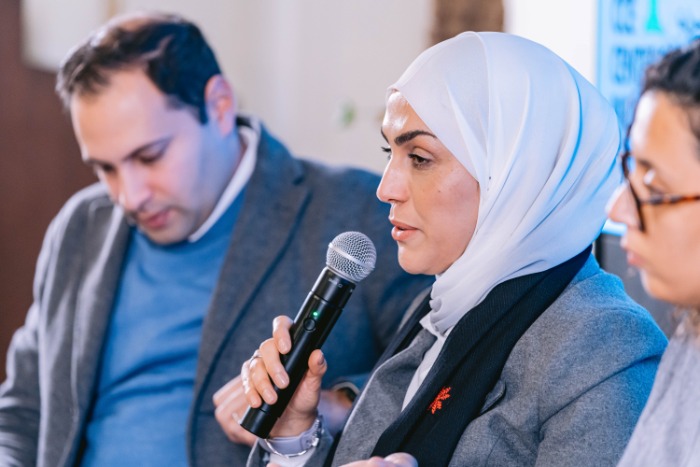
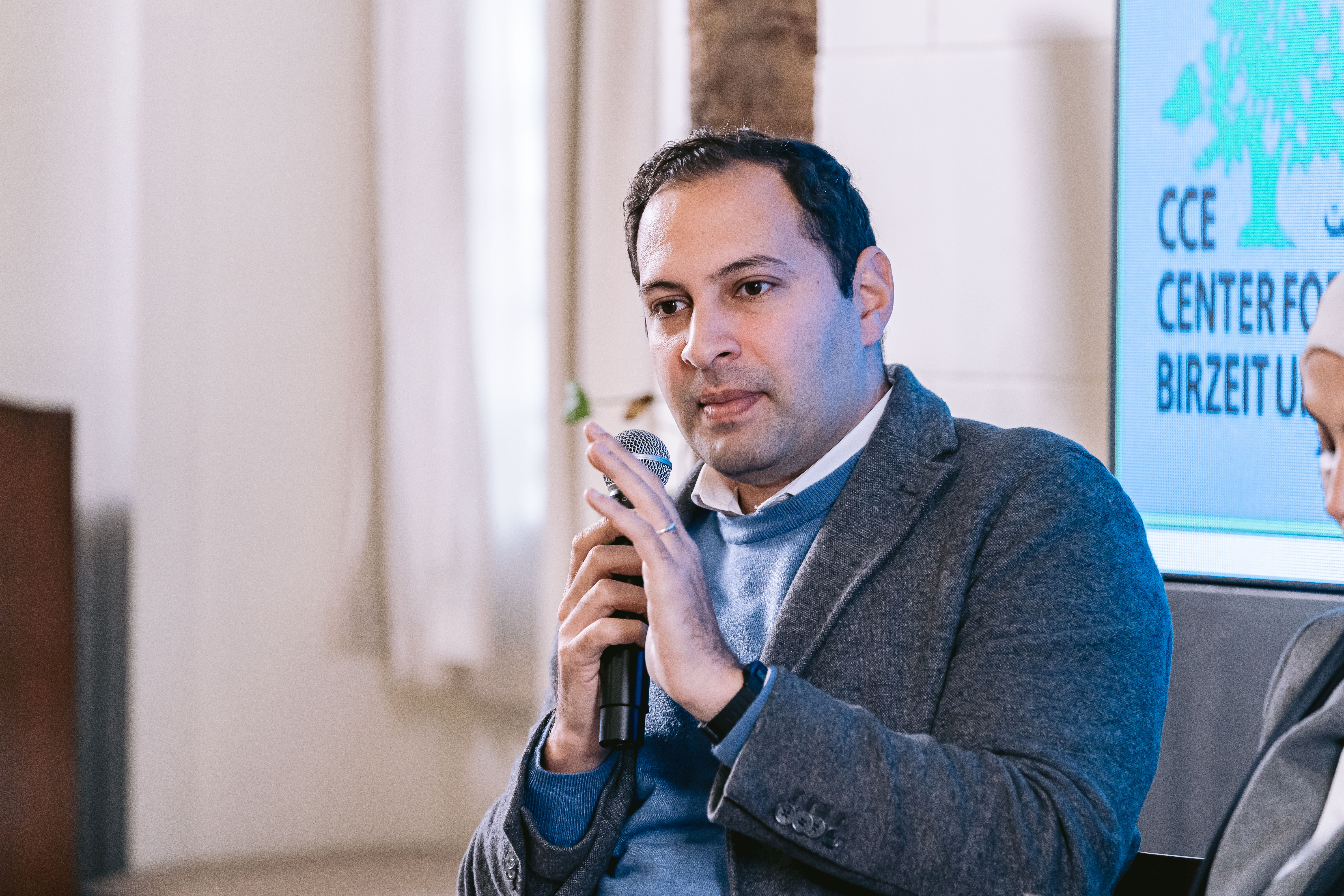
AI for Food Security: Regional Studies and Discussions
How can AI pave the way for a more sustainable and equitable food system? Our second session titled “AI for Food Security: Perspectives from MENA" navigated the transformative role of AI in food security, presenting research outcomes and policy recommendations based on position papers from Lebanon, Jordan, Tunisia, Palestine, and Egypt. The focal points of the research are the four pillars of food security; availability, accessibility, utilization, and stability, as stated by the Food and Agriculture Organization (FAO).
From Lebanon, we have Nicolas Gholam, Lynn Maalouf, Lina S. Jaber, and Shady K. Hamadeh from the Environment and Sustainable Development Unit (ESDU), American University in Beirut (AUB), as well as Salwa Tohme Tawk from Department of Economy and Development, Faculty of Agriculture, Lebanese University. From Tunisia, we have Malak Altaeb, an independent consultant, whose research focuses on exploring agricultural entrepreneurship in Tunisia and its potential for growth with AI. Focusing on AI and food security in Jordan, we have Shahed Al-Khateeb, from Yarmouk University and the Founder of World of Plant. Representing Palestine, Dr Ahmed Abu Shaban, from the Gaza Urban and Peri-Urban Agriculture Platform (GUPAP), delves into AI opportunities, barriers, and recommendations for sustainable food security in the Gaza Strip. Working closely with the A2K4D research team, Moustafa Kharma is carrying out the Egypt study, where we look beyond the agricultural sector, to explore related areas like food retail, manufacturing, logistics, distribution, and financial inclusivity.
During the workshop session, our panelists identified common challenges, including the lack of data, lack of technological awareness among farmers, gaps in infrastructure, fragmentation among stakeholders, limited financing, and economic challenges, leading to the slow pace of AI adoption. In Egypt, Moustafa Kharma highlighted the use of AI applications in food production, particularly in farming and food quality control, however, their implementation in other segments of the value chain is comparatively limited. Similar sentiments were echoed by Malak Altaeb, who echoed that AI applications in Tunisia are closely linked to agriculture and farmers. As stated by Salwa Tawk, AI adoption in Lebanon's agriculture sector remains in its early stages due to economic challenges, hindering investment in technological advancement.
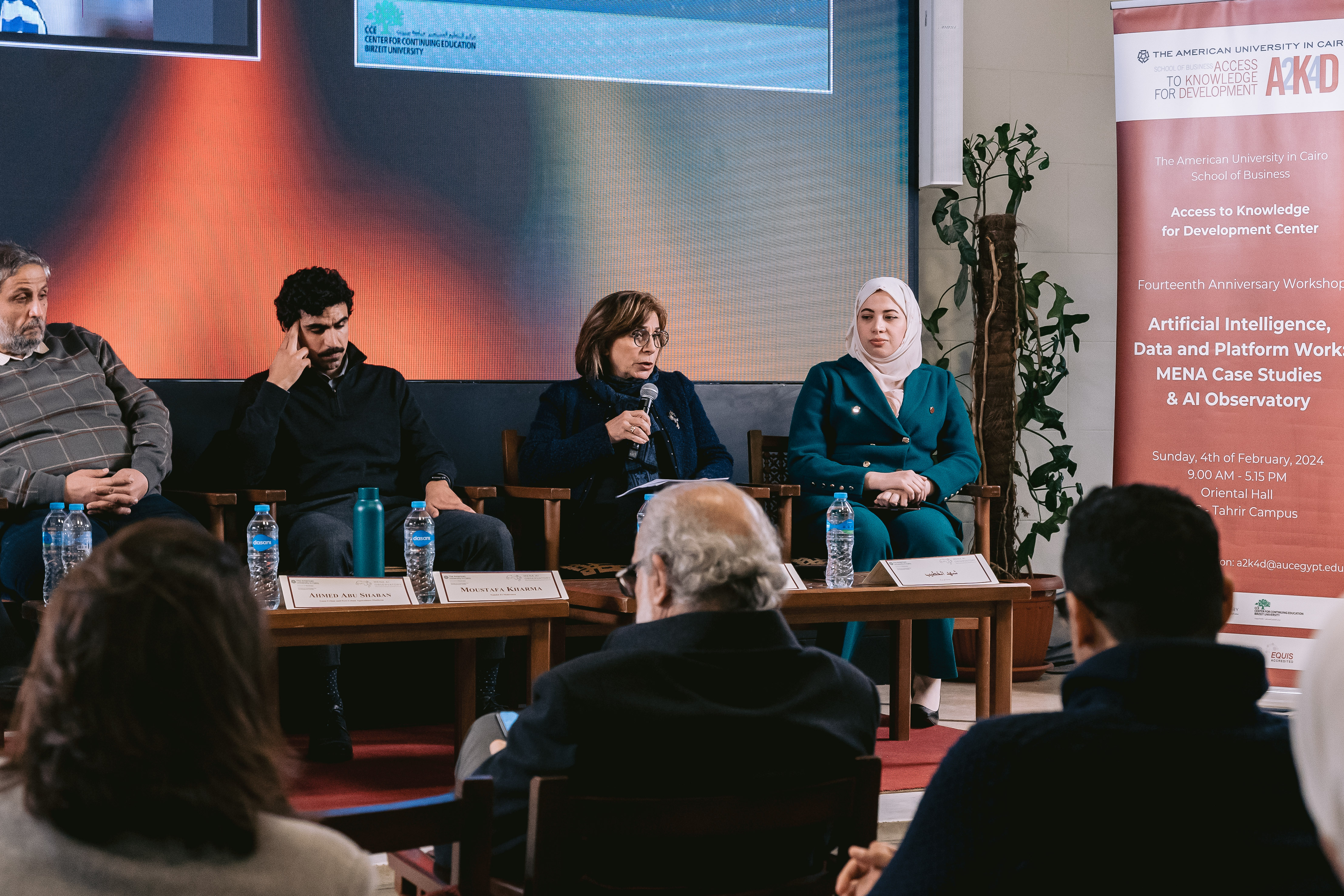
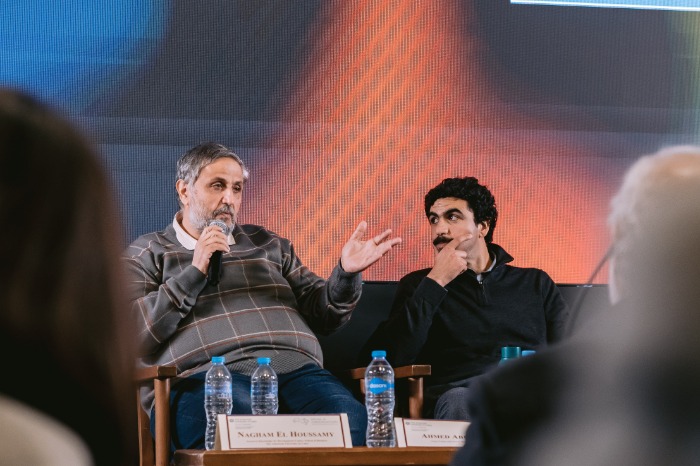
Across the region, there is a lack of comprehensive data collection, processing, sharing, and storage infrastructure necessary for AI applications to thrive. Shahed Alkhateeb emphasized the need to address these challenges, noting that available datasets are often inadequate for AI analysis and insights.
Amidst these challenges, Ahmed Abu Shaban sees a silver lining, recognizing that ‘’significant challenges present equally significant opportunities for AI deployment.’’ Initiatives in Gaza have leveraged AI to tackle complex challenges, such as Israeli land and water resource control and climate-related risks, highlighting the potential for AI to support food availability and resilience in agriculture. For instance, AI applications for early warning systems integrate climate data with other external factors to assist in decision-making at the farm level. Moreover, in Egypt, the feasibility of expanding AI solutions across the entire value chain exists in sectors like Egypt's waste management and the promising applications for scoring in personal finances and small and medium enterprises (SMEs).
To address these challenges and unlock the potential of AI in food security, our panelists proposed several recommendations, including the need for regulations that incentivize digital technology adoption and promote public-private partnerships, as well as the establishment of AI-specialized incubators to facilitate collaboration and innovation in addressing agri-food challenges. Moreover, our panelists stressed the need for AI training programs to empower the public and private sectors at all levels of digital literacy, particularly farmers, to leverage AI technologies effectively. By fostering a culture of technological literacy and collaboration, the region can overcome barriers and harness the transformative potential of AI in food security. Also, an important contribution from the audience is that AI should not always be perceived as an extremely advanced technology: It is important to prioritize technologies that are practical and viable for local contexts, rather than solely focusing on sophistication without functionality in local settings.
The Way Forward: Policy Recommendations
Our journey does not end with empirical research on data and AI. It's about paving the way forward — a future where AI technology harmonizes with developmental priorities — for actionable insights and policy recommendations. By combining empirical evidence, expert perspectives, and best practices, the research project aims to shed light on pathways toward responsible data and AI governance for development, particularly in healthcare and food security.